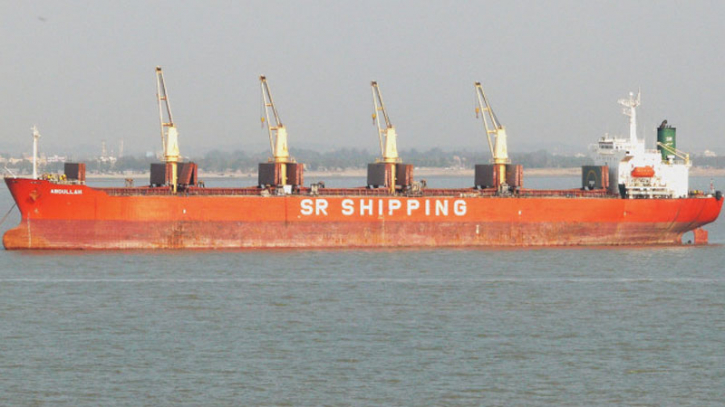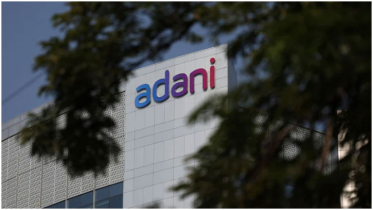Bangladeshi ship hijacked by Somali pirates in Indian Ocean

A Bangladeshi-flagged ship named MV Abdullah carrying coal and manned by 23 Bangladeshi crew members, has been hijacked by Somalian pirates in the Indian Ocean near Somalia.
The ship departed from Mozambique for Dubai last Sunday and was seized by pirates on Monday, marking the second instance of a Bangladeshi-flagged ship falling prey to Somali pirates.
Officials from the ship's owning company, SR Shipping, said the crew made contact with them on Tuesday.
"The ship managed to send a message to its company around 1:30pm, saying everyone was safe," Meherul Karim, CEO of SR Shipping which owns the ship told.
"Armed Somali pirates have seized control of the vessel and diverted it to the vicinity of Somalia yesterday. We came to know about the piracy around 1:30 pm today," he added.
Confirming the safety of the crew, Karim said, "All crew members are in good health, and we are diligently working on their safe rescue. Having previously encountered a similar situation, we are equipped with the necessary experience to manage this crisis effectively."
He further said that the pirates have not contacted them yet for any ransom.
Officials from the Department of Shipping told TBS that they have already contacted various international organisations and embassies through the Ministry of Foreign Affairs to aid in rescuing the ship and the sailors on board.
"We hope we will be able to rescue them in good health," said Captain Gias Uddin, chief nautical surveyor of the department.
Director General of the Department of Shipping Commodore Mohammad Maksud Alam said, "We are holding back from initiating contact with the ship's crew to ensure their safety. Our primary objective is the safe return of both the ship and its crew."
"We remain hopeful that the crew members are unharmed. Pirates typically do not harm ship's crews; their only goal is to secure ransom," he added.
Meanwhile, an audio clip reportedly sent to a crew member of another ship owned by SR Shipping named Arman Hossain Babu by one of the captive crew members indicated that armed pirates might steer the ship towards Somalia. Mizanul Islam, media advisor of KSRM Group which owns SR Shipping, confirmed the authenticity of the clip to TBS.
The crew member, whose name could not be ascertained, is heard to say in the clip, "The pirates attacked the ship using an Iranian fishing boat which they hijacked two months ago."
"The pirates are threatening us. I am sending this voice message from the washroom. There are 7-8 of them. They intend to take us to their camp. They all have guns," he conveyed in the audio clip.
The crew members on board are identified as Captain Rashid Mohammed Abdur, Chief Officer Khan Md Atik Ullah, 2nd Officer Chowdhury Mojaherul Islam, 3rd Officer Islam Id Tarequl, Deck Cadet Hossain Mohammad Sabbir, Chief Engineer Saiduzzaman, 2nd Engineer Mohammad Toufiqul Islam, 3rd Engineer Md Aqkan Uddin, 4th Ahmad Tanveer, Engineer Cadet Ayub Khan, Ibrahim Ullah Khalil, Mohammad Anwarul Haque, Mohammad Asif Ur Rahman, Md Sazzad Hossain, Mahamud Joy, Md Najmul Haque, Ainul Hoque, Mohammad Shamsuddin, Mohammad Ali Hossain, Mosharaf Hossian Sakil, Md Shafiqul Islam, Mohammad Noor Uddin, and Mohammed Saleh Ahmed.
The ship, designated as a Bulk Carrier, is 185.74 metres long and has a width of 30.4 metres. The ship was built in 2016 and was originally named 'Golden Hawk'. Upon joining the fleet of SR Shipping last year, the vessel was renamed 'MV Abdullah'.
Currently, Bangladesh has 96 flagships, with SR Shipping maintaining a fleet of 23 ocean-going vessels, primarily bulk carriers, which transport cargo to various ports worldwide, including in Bangladesh.
Previous incident: Same company, same pirates
This distressing incident recalls a similar event in 2010 when the MV Jahan Moni owned by the same shipping company was hijacked by Somali pirates.
The Jahan Moni was en route from Indonesia to Greece, carrying 43,000 tonnes of ore. A total of 26 individuals, including 25 crew members and the captain's wife, were onboard when the vessel fell victim to Somali pirates in the Arabian Sea on 5 December 2010. They were released from captivity after enduring 100 days of confinement.
Various organisations, including ship owners, mobilised efforts to secure the sailors' release. The Bangladesh Merchant Marine Officers Association convened a press conference to address the situation. The pirates demanded a ransom of Tk105 crore through the families of the captive sailors.
Following the payment of the ransom, the sailors returned to Chattogram via plane from Salalah port in Oman.
Rescue procedure
Authorities involved in the rescue operation of MV Jahan Moni revealed that it typically takes about a week following a ship's hijacking to identify the perpetrators and determine their demands. After hijacking a vessel, the hijackers meticulously assess the owner's organisation to tailor their ransom demands accordingly.
The ransom amount often correlates with the company's profile: smaller companies usually face lower demands, while larger ones are confronted with higher ransom requests.
Typically, hijackers do not harm the sailors if their ransom demands are met. However, it typically takes at least three months to secure the sailors' release following initial contact with the hijackers.
Shahriar Jahan Rahat, deputy managing director of SR Shipping, said, "We anticipate the kidnappers to establish contact with the company within a week. SR Shipping will prioritise the safety and swift rescue of the 23 sailors aboard once communication is initiated."
Who are the Somalian pirates?
When warlords toppled former dictator Mohamed Siad Barre in 1991, Somalia collapsed into anarchy. That led to a wave of illegal fishing, plus dumping of toxic and industrial waste, in Somali waters by foreign fleets from Europe and Asia.
Towards the end of the decade, local fishermen and militia formed groups with names like the "Somali Coastguards" and the "National Volunteer Coastguards" to drive away or apprehend the vessels from South Korea, Italy, Spain, Thailand and other countries.
Seeing how easy it was to capture ships, those groups metamorphosed this decade into old-fashioned pirate gangs, becoming ever more sophisticated in methods and bold in range.
In the early days, pirates with a few guns used fishing boats to approach vessels, and then simply tried to scramble on board or throw up ropes.
As they gained money from ransoms, plus experience, they bought speedboats, tracking devices and more powerful weapons.
Ocean shipping plagued by risks
International shipping routes have faced severe disruptions as Yemen's Houthi rebels fired missiles and conducted drone attacks on merchant ships in the Red Sea and Gulf of Aden protesting Israeli attacks in Palestine's Gaza.
The rising attack of pirates in Somalia around the Horn of Africa region is adding to concerns for shipping vessels, government forces and private security already locked in a battle in the Red Sea with Houthi rebels.
The ocean shipping industry entered this year with the highest degree of risk in the last 25 years, according to a report by Reuters.
President of the Bangladesh Merchant Marine Officers' Association, Captain Md Anam Chowdhury, said that pirate attacks in the Indian Ocean area had decreased. However, he noted an uptick in activities by pirates, attributed to recent incidents in the Red Sea, where security measures have been intensified.
Global piracy costs the world economy tens of billions of dollars annually.
Source: The Business Standard
.png)




